

Taking Notes for the Listening Section of the TOEFL® Test
Taking Notes for the TOEFL Listening A Step-by-Step Guide
Let’s start by addressing the big, fat elephant in the room.
Every student’s favorite question…
“Do I have to take notes?”
No, you don’t have to take notes.
Say what?
Seriously. Many students find the TOEFL Listening Note taking process so difficult that they give up and just listen without taking notes.
And, some do well.
However, almost none score above a 25/30 in the TOEFL Listening section.
Most TOEFL Listening passages are at least five minutes long, and they are jam-packed with content.
It’s nearly impossible to remember enough information to answer every question correctly, which is why most who don’t take notes fail to score higher than a 25.
But if you’re anything like us, you want to be at your best. You want to maximize your potential and reach the highest possible score you can in the listening section.
And we want to show you how to do it.
We are going to take you step-by-step through the notetaking process for the TOEFL Listening so you know exactly what you need to do to take more notes in less time.
We will start with the three TOEFL Listening notetaking tips you must master first. And from there, we are going to use those tips to help us write notes for listening to conversations and lectures.
Let’s do it!
Oh snap, before I forget, let me add a link here to our free download of 100 Practice Questions for the TOEFL Listening Section.
We specifically designed these questions for students like you who are looking to build their TOEFL Listening note taking strategies.
Check it out and let us know if you have any questions.
How to take notes in the TOEFL Listening section?
All right, back to the lesson.
Three rules for taking TOEFL notes
- Write down only nouns, verbs, and adjectives (content words)
- Write down consonants (vowels are hardly ever needed)
- Know your core symbols
#1 Write down only nouns, verbs and adjectives
Let’s use some fancy vocabulary here.
You should write down only content words, and leave out function words.
Content words are meaningful words that contain significance, such as people or places, actions, and descriptions.
Function words are things like prepositions, articles, auxiliary verbs (have), and modals (may, could), which provide almost no useful information about the material.
Well, there are SOME cases in which function words come in handy. They may help you in instances where they are essential to understanding the main idea of a given sentence, for example, “He’s in the car”, and “He’s under the car,” carry a significant difference in meaning. Still, for the most part, you should focus only on writing down nouns, verbs, and adjectives.
Let’s practice. Only jot down the content words that will be most helpful in aiding your memory.
Insomnia, a consistent difficulty in falling or staying asleep, is the most common of the sleep disorders.
Insomnia common disorder
It is not uncommon for people suffering from insomnia to experience increased levels of anxiety about their inability to fall asleep.
More anxiety falling asleep
Chronic insomnia is almost always associated with feeling overtired and may be associated with symptoms of depression.
Chronic symptoms overtired depression
Not so bad, right?
Now let’s move on to the next rule.
#2 Write down consonants, not vowels
- sleep → slp
- symptoms → smptms
- depression → dprsn
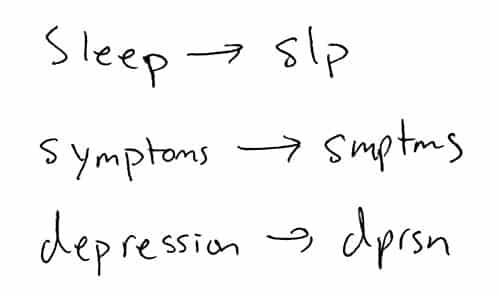
- anxiety → anxty
- create → crete
- treaty → trty
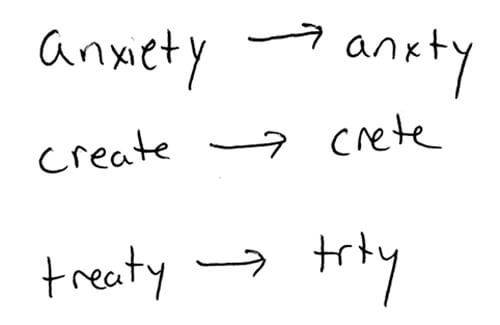
Experiment and find an approach that works best for you.
Let’s try those sentences again, this time incorporating rule #2, only consonants.
Insomnia, a consistent difficulty in falling or staying asleep, is the most common of the sleep disorders.
- Insma cmn dsrdr
Now try the next two on your own…
It is not uncommon for people suffering from insomnia to experience increased levels of anxiety about their inability to fall asleep.
Chronic insomnia is almost always associated with feeling overtired and may be associated with symptoms of depression.
Exciting right?
I know, I know, the TOEFL can be a bit dry sometimes, so, if you are reading this right now I am so proud to be able to share this information with someone as motivated as you are to achieve your TOEFL score.
Let’s get back into it.
There’s one more important rule to consider when taking notes for the TOEFL Listening section.
#3 Know your core symbols
Below is a chart of the nine most important symbols to incorporate in your TOEFL Listening note taking.
Important Symbols |
|
|---|---|
| Symbol | Meaning |
| + | benefit, positive, also, as well, together, combined |
| Ø | not, no, negative, stop |
| ? | I'm not sure, lecturer not sure, question |
| ↑ | rising, increase, improve, positive, beneficial |
| ↓ | going down, decreasing, problematic, hurting |
| → | leads to, results in, follows |
| = | is equal to, the same as, something is like/similar to |
| ≠ | not equal to, not the same as, dissimilar |
| / | and, connected to |
Symbols are important. Not only do they save time, but also increase the amount of information you write down about the listening passages.
But if you are new to using symbols, do NOT try to incorporate all nine of these symbols in your notes at once.
The key is to keep it simple. Start with just two or three. I suggest the arrows since they are the easiest to understand.
As you start to feel more comfortable, incorporate more of these symbols in your note taking listening exercises. Remember, it’s hard to change a habit. You have been taking notes your own way for years. It will take some time to get used to all of this information, so take it slow.
Let’s look at those sentences again. So far we have noted the content words and omitted most of the vowels, now let’s include a few symbols.
Insomnia, a consistent difficulty in falling or staying asleep, is the most common of the sleep disorders.
- Insmna = cmn slp dsrdr
It is not uncommon for people suffering from insomnia to experience increased levels of anxiety about their inability to fall asleep.
- ↑ anxty ⌀ aslp
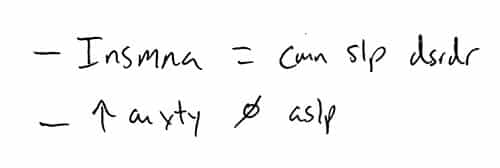
You try the last one…
Chronic insomnia is almost always associated with feeling overtired and may be associated with symptoms of depression.
See. It’s getting easier already!
Right?
Right…
How to take notes for TOEFL Listening Conversations
- Write down content words
- Write down consonants
- Know your core symbols
- The student presents a problem
- The campus worker offers a solution
- They discuss how to solve the problem
- problem
- solution
- steps
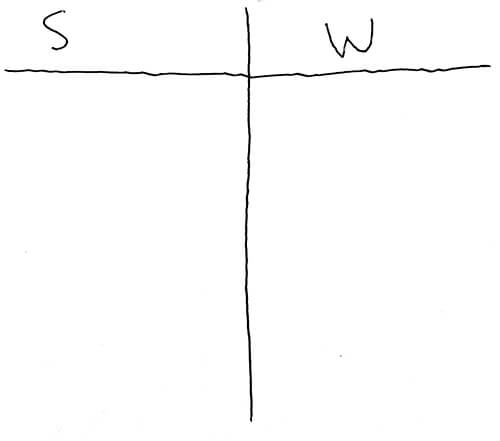
- S = student
- W = campus worker
- Things you could write down – relatively easy to remember, so you probably don’t have to write it down
- Things you should write down – important information that is slightly more difficult to remember
- Things you must write down – information that is definitely important and difficult to remember
Get access to TST Prep’s Complete Test #13 so you can learn exactly what to expect on test day.
Go to the listening section and practice taking down notes for the two conversations. Don’t try to write down everything, but instead focus on the structure of the TOEFL Listening conversation and the most important points.
- could
- should
- must
Your Notes |
|
|---|---|
| could |
|
| should |
|
| must |
|
Stop trying to understand every detail of the listening. Start to focus on points you must write down, like assignment requirements and rules that need to be followed, which are much more likely to help you answer the questions.
How to take notes for TOEFL Listening Lectures
Most TOEFL teachers and books tell you that when you are listening to the lecture, you have to write down the main idea. Well, I have some surprising news…
Despite what you might think, the main idea of the lecture is not the most important thing you want to look for.
That’s right, you do NOT have to write down the main idea in your notes.
- “Why does the professor say this?”
- “What does the professor want the students to know by the end?”
- “Why is this information important?”
- “How does the professor elaborate on, explain, or illustrate the main idea?”
Your job is NOT to understand every word you hear, but instead to identify the main idea and the important points that elaborate on the main idea.
- Things you could write down – relatively easy to remember, so you probably don’t have to write it down
- Things you should write down – important information that is slightly more difficult to remember
- Things you must write down – information that is definitely important and difficult to remember
Your Notes |
|
|---|---|
| could |
|
| should |
|
| must |
|
Practice makes perfect?
I know this TOEFL stuff can get a bit frustrating sometimes. So don’t hesitate to reach out and let us know if you have any questions or concerns: contact@tstprep.com
Did we miss anything? Or do you have a comment?
Please add your ideas in the comments section below.
We promise to respond to every single one!
Also read:
Create a FREE
Practice Account
Join now and start learning with our free materials



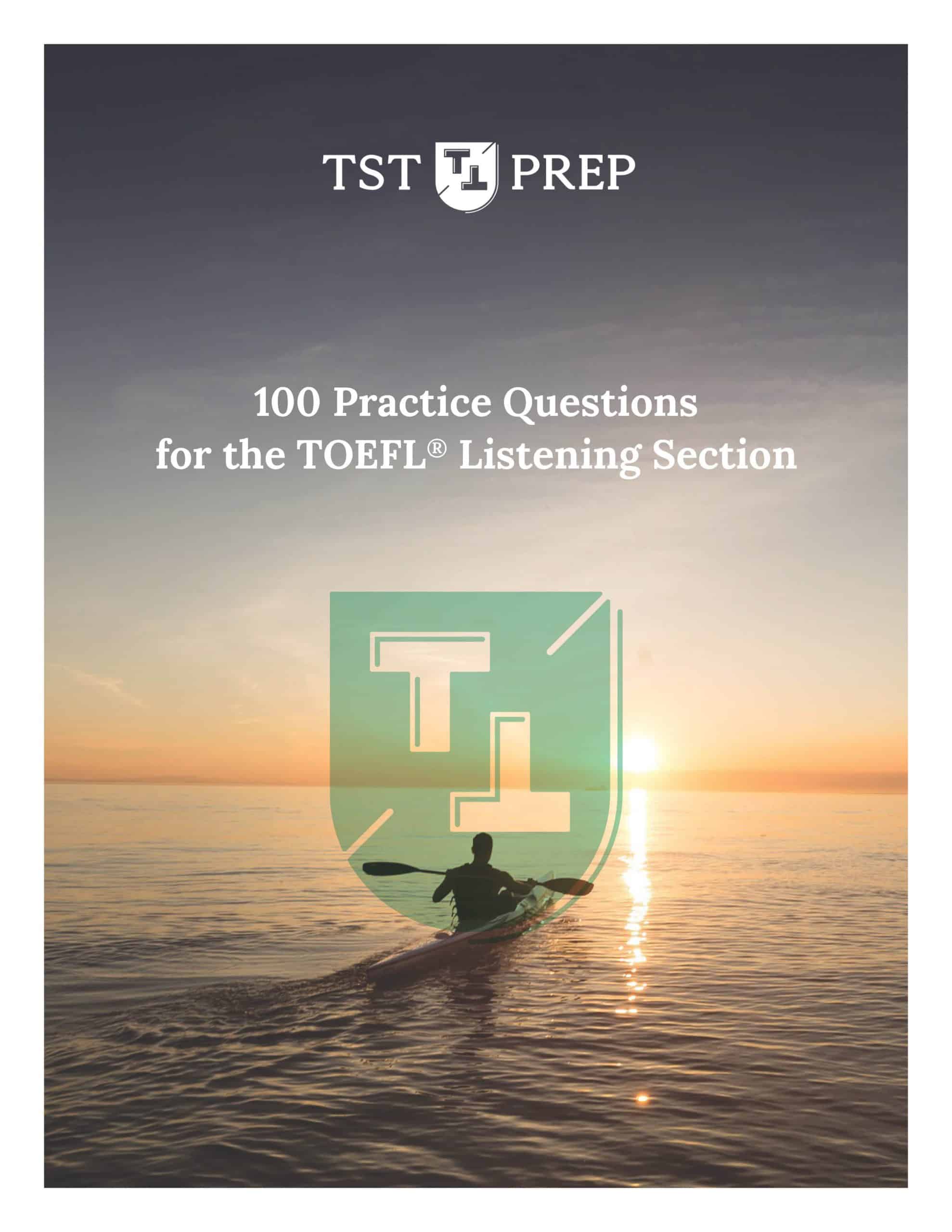
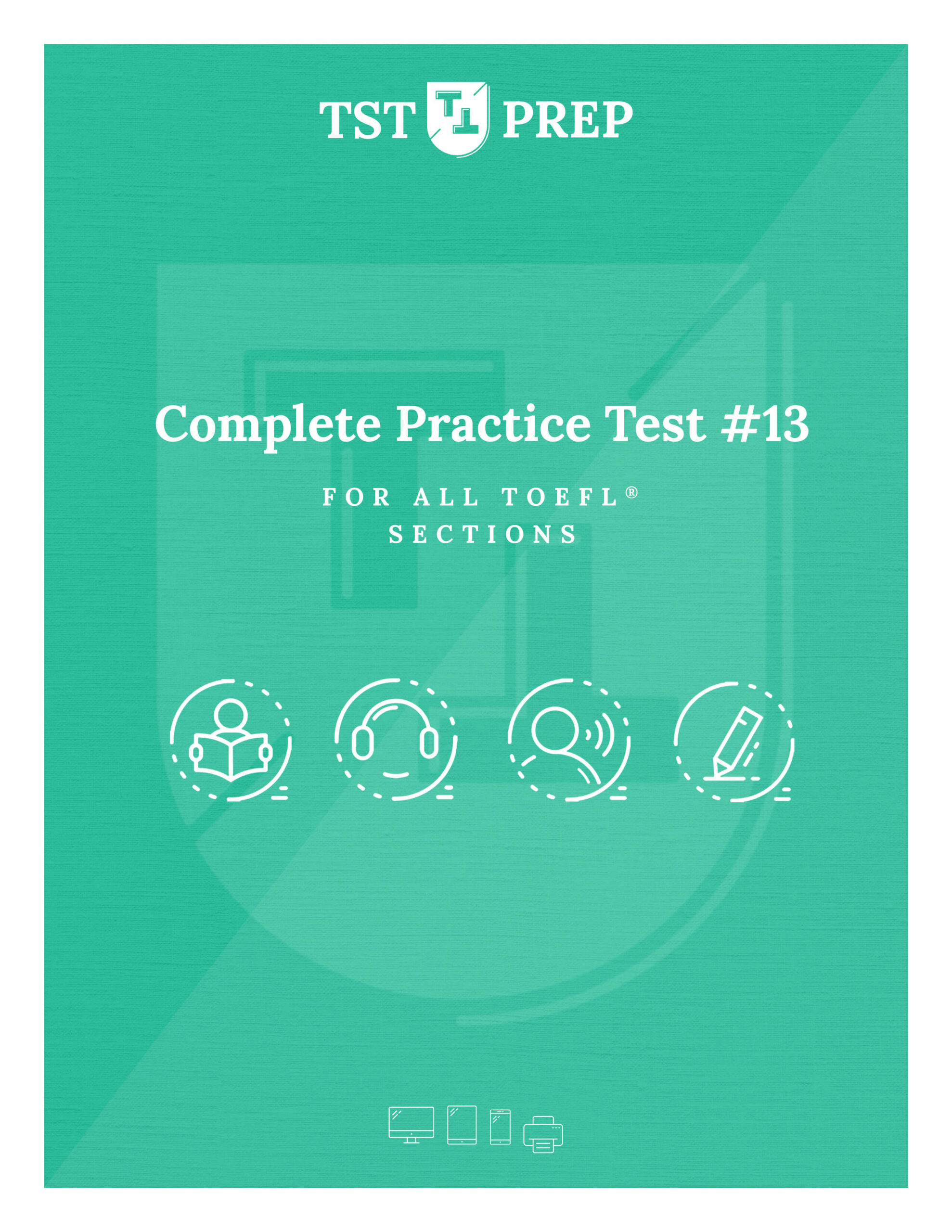




45 Comments
Comments navigation
Nimra
Hey Josh, thanks for the lesson!
Please give me any suggestions to improve my listening ability because I am not a native speaker. I found difficulty in understanding the fast speaking English conversation.
Josh
Hi there Nimra, you might find this lecture helpful on how to improve your listening skills. I hope it helps. https://vimeo.com/437708258
Mariana
Hey Josh! I am absolutely grateful for finding this platform. I’ve watched almost all your YouTube videos and I have a long path ahead of me to absorb all this wonderful content you have available here. I just wanted to tell you how I appreciate your work, and that I’m sure you’re helping not only me but a lot of other confused students around the world. Also, I wanted to ask a tip about how to improve my grammar skills by myself (with no one to proofread it). Especially when it comes to the use of punctuation signs, how to write short sentences correctly and how to avoid the “I” overuse. I would appreciate it if you could help me with these questions. Thanks in advance.
Josh
Hi Mariana and first of all, thank you for your kind words! It means A LOT. Secondly, in regards to your question, I find that students who get feedback on their writing improve the fastest. So, in other words, instead of buying a grammar book, write a lot and get a lot of feedback. Besides working with a teacher, you could also try using an automatic grammar checker like Grammarly. They have a “premium” version that will give you extensive feedback on your writing. There is one book I sometimes recommend as well, with good exercises and explanations for intermediate to advanced students. I will put a link below. I hope this helps Mariana. https://www.amazon.com/English-Grammar-Use-Self-study-Intermediate/dp/0521189063/ref=sr_1_3?crid=2CCY9QK1H2MCO&dchild=1&keywords=english+grammar+in+use&qid=1587775307&sprefix=english+grammar+%2Caps%2C326&sr=8-3
Mariana
Thank you, Josh. You’re the best!
Shahd
Thank you so much for such great tips on how getting improve. Although, my main problem is that I am really slow in note taking the way that I have to listen twice to get all the information especially for speaking question 3-4 where my answer depends on the notes I take. Your advice is really appreciated.
Josh
Hi Shahd and thank you for your question. It sounds like you need to build your listening and notetaking skills a bit. So, start small. Do not try to write down everything you hear. Instead, write down just 5 words, that’s it, and then try to answer. If you feel comfortable with 5 words, try to write down 6 words tomorrow, and so on, building your skills along the way.
I hope that helps!
Faizullah
Hi dear. How can I improve my note-taking skills fast? My test date is not so far, so it will help to acquire my confidence.
Josh
Another strategy you can try is taking no notes at all. This won’t work for everybody, but can be a good strategy if you find your notes are not helping you answer questions. It might be better to use all your energy to listen and try to understand. About half of my students use this method. Maybe it can work for you.
Hakim
Please help me, on the all of segment of the toefl. Because I need to somebody help me and get a top score on the toefl.
Josh
Hi Hakim and thank you for your question. Well, everything on the site is designed to help you. However, if you still need further assistance, you might want to check out our private lessons here – https://tstprep.com/toefl-store/toefl-private-lessons/
Sadana Vashishta
Hi, I just want to say thank you for putting an article about note taking for the TOEFL exam. I took the exam a long time back right out of college, now that I’m going to apply for a few universities for masters I was looking for info specifically about note taking. I can manage pretty well without notes, but as you’ve rightly mentioned in the article, I wouldn’t want to leave out the 3-5 marks that I could otherwise get by taking proper notes.
I tried few exercises from Official TOEFL book and Kaplan and it worked very well for me. Thank you again.
Josh
Sadana, thank you for taking the time to leave such a thoughtful remark. It took a lot of trial and error to figure out a note taking approach that helps, so I’m glad you found it useful as well. Good luck on the test!
Comments navigation